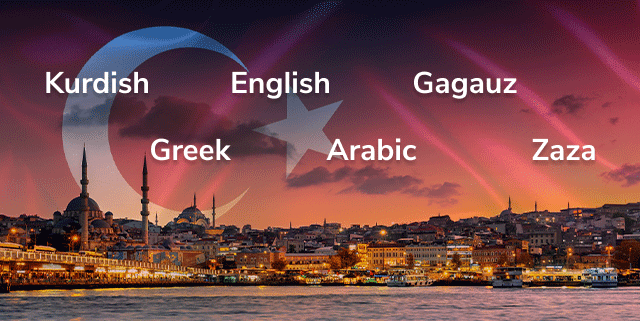The Republic of Turkey which was once the hub of the Ottoman Empire holds great importance in the global world. It has an enriched history, civilization, and culture. The strategic location of Turkey combines both Asia and Europe. Moreover, it has a silk road through which people trade between Europe and Asia.
Many nations colonized Turkey in the past. Therefore, these rulers have a great impact on Turkey’s culture. Although the official language of Turkey is Turkish, several regional languages are also popular in Turkey. These languages came into existence because of the interaction between foreigners with local Turks.
Table of Content
Why is the Turkish Official Language of Turkey?
Every country has its official language which they use to run the operations of the country. In the constitution of Turkey under Article 42, the Turkish language holds the status of official language. Because of its official status, it is the most spoken language in Turkey.
Languages Spoken in Turkey
Other than the Turkish language, 30 ethnic languages are spoken in Turkey. However, a small number of people speak these languages. Therefore, we can call them minority languages. Languages that are spoken in Turkey are spoken according to their region. They get importance according to the number of speakers. Furthermore, experts categorize them as foreign languages, ethnic languages, and immigrant languages.
Turkish
Although the Turkic language family contains many other languages, Turkish is widely popular of all. It is native to 77.8 million people spread all around the world. In Turkey, 99% of the Turkish population speaks Turkish in the daily conservation of life. Out of this number, 93% speak Turkish as their native language and only 6% use it as a second language.
Many experts debate that Turkish is part of the Altaic family and have a close connection to Mongolian, Japanese, and Korean. It has many unique characteristics. The language contains a vowel word with melodious harmony. When joined together, these vowels form a beautiful word. To your surprise, there are no grammatical gender and noun classes in Turkish. It is mutually intelligible with Turkmen, Tatar, Kazakh, Uyghur, Uzbek, Kyrgyz, and Azerbaijani.
Before the reforms of Mustafa Kemal Atatürk, the Turkish language used to follow Arabic letters for its writing. Since the Arabic alphabet comprises no vowels, Turkey was looking for its own writing system. As a result of this, Mustafa Kamal began the linguistic and standardization revolution of this language.
Thus, In 1923, Turkish started using the Latin alphabet. That means if you’re a native speaker of English, French, Spanish, Norwegian, German, Italian, Dutch, Portuguese, Polish, Danish, Swedish, Icelandic, Finnish, or Welsh, you’ll have a significant advantage when it comes to learning Turkish. However, please take note that a few unfamiliar letters will also be there. It’s to make the Turkish pronunciation better.
Kurmanji
Northern Kurdish is another name for Kurmanji. It is a Kurdish dialect that different parts of Iraq, Iran, Turkey, and Syria speak. Moreover, it is the ancient religious language of the Yazidis. The oldest written scriptures of Kurmanji date back to the 1500s. It follows a famous Latin writing system that resembles the Turkish writing system. While English also follows the Latin alphabet, native speakers of English will find it hard to understand not just the meaning but the pronunciation of certain words as well.
Approximately 80% of Kurds are ethnic groups of the middle east who speak Kurmanji. The five main dialects in Kurmanji are Southwestern Kurmanji, Northwestern Kurmanji, Southern Kurmanji, Northern Kurmanji, and Anatolian Kurmanji (or Badini). Approximately 8 million people in Turkey speak Kurmanji. Moreover, three million Turkish residents speak monolingual Kurmanji. This has created a problem in Turkey because according to their constitution, no other language can be used for education or training other than the Turkish language.
Arabic
Arabic is a Semitic language from the group of Afro-Asiatic languages. it is like Maltese, Hebrew, and Amharic languages. As we all know, Arabic is the most spoken language in the Middle East. However, Turkey also speaks Arabic because of its proximity to Arab countries. The name for the Arabic dialect spoken in South-eastern Turkey is Mesopotamian Arabic. This dialect is also popular in Iran, Iraq, Cyprus, and Northern Syria. Long ago, people all over Mesopotamia used to speak North Mesopotamian Arabic. But now its use has become limited to some parts of South-eastern Turkey. Approximately, 2 million Turkish citizens with Turkish ancestry speak the Arabic language whereas 1-2% of native Turkish people speak Arabic. At present, the number of people who speak Arabic in Turkey has immensely increased because 3 million Syrian refugees migrated there.
Zazaki
Another language spoken in Turkey is Zaza. It is an Indo-European language. Mostly, the Zazas (also Kird, Kirmanc, or Dimili) in Eastern Turkey speak it. This language is from the Zaza-Gorani group of languages which is also a part of a north-western group of the Iranian branch. The glossary of the Zaza language is scornful. Therefore many Zazas called it Dimili. This language is mutually intelligible with Tati, Talysh, Gilaki, Semantic language, Mazandarani, and Gorani. Moreover, the Kurdish language has also influenced this language because the interaction between Zaza and Kurdish is from centuries. Therefore, people that speak Zaza consider themself as Kurds and they identify this language as a Kurdish dialect. More than 1 million people speak this language. This language has three major dialects. The people of Zaza that live in the hometown of Northern Iran and the Caspian Sea have great influence over these dialects.
Armenian
Do you know that Turkey is home to 61,000 Armenian speakers? But now this number is decreasing. Approximately, 50,000 people that reside in and around Istanbul speak this language. Therefore, another name for Armenian is the Istanbul language in Turkey. The Armenian language has many different dialects including middle Armenian, old Armenian, and modern Armenian. Modern Armenian has further two different varieties of it: Western Armenian and Eastern Armenian. Moreover, before 1915, Armenian has about 50 dialects. But this number did reduce after the massacre of the Armenian population in Turkey. One important thing to note is that all the dialects of this language are mutually intelligible.
Gagauz
Gagauz is also one of the Turkic languages. It is the Turkish language spoken by the people of Ukraine, Russia, Moldova, Turkey, and Russia. It has two dialects called Maritime Gagauzi and Bulgar Gagauzia. The most distinct dialect is Balkan Gagauz Turkish. The origin of Gagauz is not clear. At the start of the 20th century, there were 19 different theories about the origin of this language, after some time, the theories increased to 21. Do you know in these theories, Gagauz people are depicted as the heirs of Cumans-Kipchaks and Bulgars? According to Eastern Orthodox Christianity, their ancestors lived in the Balkans before the invasion of the Ottoman Empire in the 14th century.
English
Although English is a universal language, you’d be surprised that English prevalence in Turkey is quite low. It is reported that only one-fifth of the population speaks English. According to recent reports, only 15-20% of the population speaks English, that too at a basic level. Therefore, you will not find fluent English speakers in Turkey. If you are planning to go to Turkey then only in Istanbul you will find English speakers in the tourist hotspots. So, it’s better to get a know-how of Turkish before planning to go to Turkey.
Languages Spoken by Immigrants and Foreigners in Turkey
Many people from around the globe wish to migrate to Turkey because its civilization is an amalgamation of both Asian and Western cultures. German, French, and Italian are also spoken in Turkey. Moreover, they are also taught in schools. Many immigrants when communicating with local people resulted in the formation of different ethnic languages. The immigrant languages spoken in Turkey are Tatar, Adyghe, Albanian, Bosnian, Kabardian, Georgian, and Crimean.
Wrapping Up
Turkey due to its strategic location plays an important role in global logistics. If you want to expand your business in Turkey then you must know the Turkish language. This is because, despite the various languages spoken in Turkey, they give importance to their official language.
Resources:
- English Speaking Countries in Africa
- English Speaking Countries in Europe
- How Many Countries are There in the World?
- How many languages are Spoken in India
- Spanish Speakers Have When Learning English
- Literary Translation and Non-literary Translation
- Literal Translation & Free Translation
- My Opinions about Learning English
- Hardest Languages to Learn in the World?
- Most Sweetest Languages in The World







